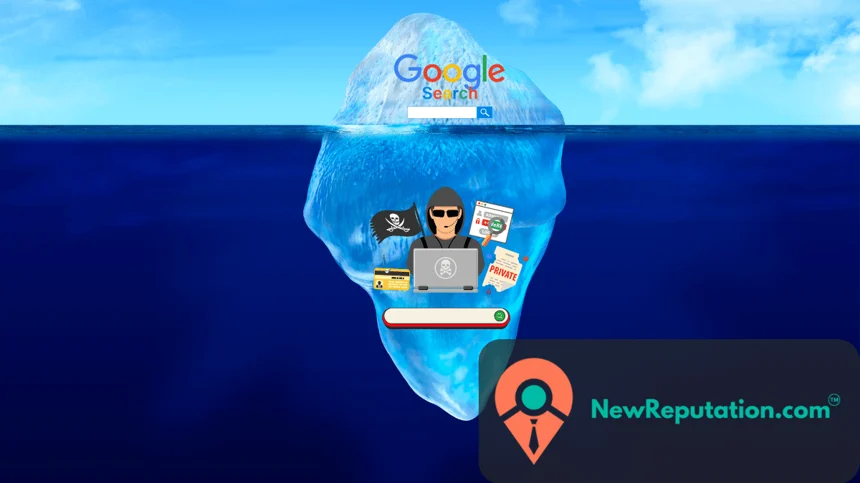The internet is like an iceberg. The surface web, which is what you see on Google, is really a small part of what is really there.
The Deep Web is a big part of the internet that search engines don’t index. It’s not always shady, but it’s not always easy to find. You probably don’t know everything that’s out there if you haven’t conducted a comprehensive Google search for your name.
This article will teach you what the Deep Web is, how to reach it, and how to utilize it to get information about yourself that you couldn’t find with a typical Google search.
What is the Deep Web?
First, let’s clarify a common misconception. The Dark Web and the Deep Web are not the same thing.
The Deep Web consists of sites and databases that regular search engines don’t index. Google doesn’t index them for a reason. They are behind paywalls, logins, or private networks.
Some examples are:
- Academic journals behind subscriptions
- Accounts for email, online banking, and private social media
- Intranets and secure networks for businesses
- Court documents, property records, and medical records that need logins
- Data that is up to date, such flight schedules or e-commerce listings
Some people believe that the Deep Web is several dozen times larger than the surface web. It doesn’t show up as much, but it has a lot more information, including personal information about you.
Why should you do a deep search?
Do you think you have your internet presence under control just because your Google results look good? Think again.
If you dig deeper, you might find:
- Profiles of data brokers. These sites collect your old addresses, phone numbers, even relatives’ names.
- Records that are open to the public. Divorces, litigation, and liens are records that may be hard to find but are still available.
- Accounts that have been forgotten. A forum post or blog account that you stopped using years ago.
- Money information. Past property ownership, business filings, or licenses.
- Old mentions. News snippets or old pages that don’t show up in surface search anymore.
Some of this information isn’t dangerous. But some of information could affect your personal reputation or privacy. That’s why it’s worth the time to look yourself up in depth.
What search engines can dig deeper?
Google won’t let you see what’s on the Deep Web. But certain search engines are good at going deeper.
- Torch is one of the oldest and largest Deep Web search tools.
- DuckDuckGo — privacy-focused with some capacity to reach deeper results.
- Ahmia is a browser that focuses on security and openness.
- Haystack keeps track of government and school websites.
- Yippy gets information from several places and puts privacy first.
These aren’t flawless, but they can find stuff that Google can’t. For the best results, use them alongside other tactics.
How to Look Deeply Inside Yourself
So, how do you really execute a deep search? Here’s a useful way to do it:
- Use engines designed for specific tasks. Try DuckDuckGo, Torch, or Yippy. Please type in your name, email address, or any usernames you know.
- Look at forums and social media. A lot of platforms don’t show up on Google, but you may still see posts when you log in.
- Check out public records. You might be able to search for court documents, property deeds, and licenses by name.
- Think about paying for services. Background check sites get information from many databases on the Deep Web.
- Check your own accounts. Sign in to old profiles and update privacy settings or remove them completely.
- If you need help, ask for it. A reputation management expert can do more, especially if you unearth information that hurts your reputation.
It’s like being a detective and cleaning the house at the same time.
What if you come upon something that bothers you?
You can come upon information that you don’t like. It might be an old record or a mention on a data broker site. What happens next?
- Change your privacy settings. Don’t let outsiders view too much on your accounts.
- Send in requests to opt out. Many data brokers allow deletions if you fill out a form.
- Get in touch with the source. If a site has something wrong or old, ask them to take it down.
- Get legal help. You could need professional aid if you are being harassed, defamed, or have sensitive data leaked.
- Manage your reputation. Experts can monitor reviews and comments, delete, or hide bad information.
The most important thing is not to panic. With the correct strategy, you can either manage or limit most information.
Get into the habit of doing deep searches
It’s helpful to do a comprehensive search on yourself once. It’s better to run one on a regular basis.
Your information is always changing. New records are made. Old accounts come back. Businesses get new information. You can avoid surprises by checking in every few months.
You can think of it like looking at your credit score. Not fun, but worth it. A healthy online presence is worth maintaining.
Conclusion
Once you know how it works, the Deep Web isn’t a mystery. It’s the part of the internet that you can’t see unless you log in, pay, or search via databases. And it holds far more about you than Google ever will.
By undertaking a deep inquiry on yourself, you develop awareness – and with awareness comes control. You can remove personal information that shouldn’t be public, preserve your privacy, and modify how people view you online.
That’s not something you can choose to do. It’s necessary.
If you want professional support, check out NewReputation online reputation services. They can help you protect your digital footprint, delete harmful content, and safeguard your online privacy.
Visit NewReputation to learn more.

Kevin Curran is the founder and CEO of NewReputation, a renowned online reputation management firm. He is also the co-founder of ReputationPrivacy, a platform designed to help individuals manage their digital footprint effectively. Kevin has worked with diverse clients, including Fortune 500 companies, high-profile executives, and small business owners, to establish an authentic online presence that accurately represents their brand.

